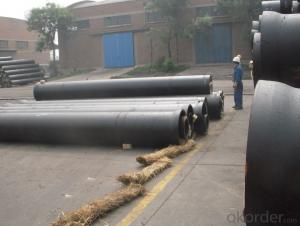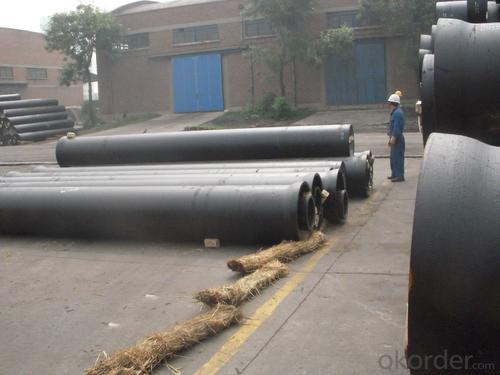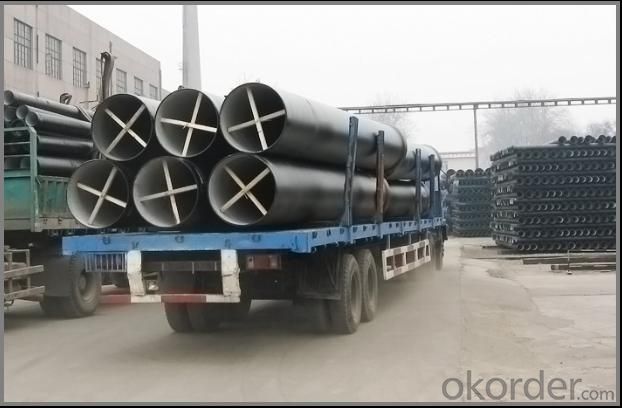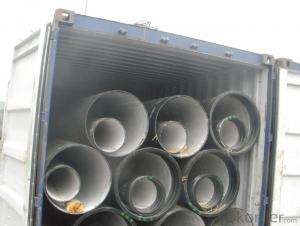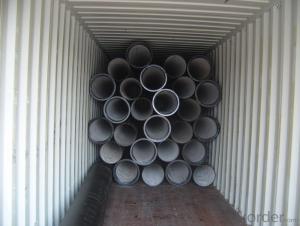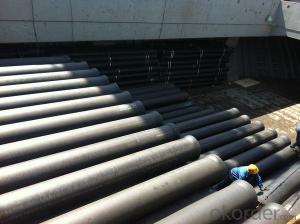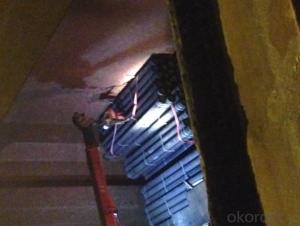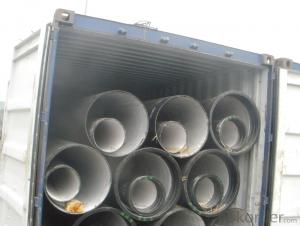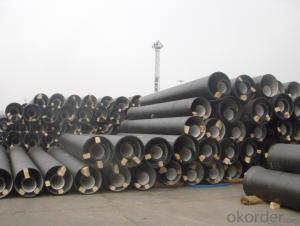DUCTILE IRON PIPE AND PIPE FITTINGS C CLASS DN1100
- Loading Port:
- Tianjin
- Payment Terms:
- TT OR LC
- Min Order Qty:
- 23 pc
- Supply Capability:
- 3000 pc/month
OKorder Service Pledge
OKorder Financial Service
You Might Also Like
· Material : Ductile Cast Iron
· Size Range : DN 80mm to DN 2000mm
· Unit Effective Length : 6m or 5.7m
· Manufacture Standard: ISO 2531:1998/ EN 545:2006/EN 598:2007
· Annual capacity : 200,000 tons
· Coating Exterior: Zinc 130g/m2 according to ISO 8179-1 and bitumen coating 70 microns.
· Cement Interior: Portland Cement/ High Alumina Cement/ Sulphate Resisting Cement Lining according to ISO 4179
· Special requirements on external coating and internal lining can be applied
· We also provide accessories such as SBR/EPDM rubber gaskets, lubricant paste, pipe caps, PE sleeves, etc.
Additional Parts:
Each pipe is strictly inspected according to related standard to ensure permanently high performance.
Easy Installation at site and service free for life
Long Service Lifespan
Quotation will arrive you within 24hours once we get your inquiry.
We guarantee offering you a competitive price.
A copy of original inspection reports of pipes will be offered after shipment.
Photos of loading process will be sent to the customer after shipment effect.
We will follow-up the delivery progress after shipment effect and update to the customer on weekly basis.
- Q: Can ductile iron pipes be used in geothermal systems?
- Yes, ductile iron pipes can be used in geothermal systems. Ductile iron is known for its strength and durability, making it suitable for various applications including geothermal systems. It can withstand high temperatures and pressures, making it an ideal choice for transporting hot fluids or steam in geothermal systems. Additionally, ductile iron pipes have excellent corrosion resistance, which is crucial in geothermal environments where the fluids can be chemically aggressive.
- Q: What is the relationship between the installation direction of the ductile iron pipe and the direction of flow?
- Suppose the water flows from east to west, then the pipe mouth is in the East socket at the West
- Q: Fire water supply network adopts ductile iron pipe, the test pressure should be no more than MPa
- Strictly speaking: the outer pipe network and the internal pipe network are the same. Minimum fire 1.0MPa, minimum sprinkler 1.4MPa. Because not only in accordance with the water pump, but also take into account the pressure on the fire engine.
- Q: Can ductile iron pipes be used in areas with high levels of organic matter in soil?
- Yes, ductile iron pipes can be used in areas with high levels of organic matter in soil. Ductile iron pipes have excellent corrosion resistance, making them suitable for various soil conditions, including those with high levels of organic matter. They are resistant to chemical attacks and offer long-term durability, making them a reliable choice for such environments.
- Q: How are ductile iron pipes tested for quality?
- Ductile iron pipes are tested for quality using various methods to ensure they meet the required standards and specifications. One common test is the hydrostatic pressure test, which involves subjecting the pipes to water or other liquid under high pressure to check for any leaks or weaknesses. The pipes are typically filled with water and the pressure is gradually increased to a predetermined level. This test helps to identify any potential defects in the pipes that could compromise their integrity. Another important quality test for ductile iron pipes is the tensile test. This test involves pulling a sample of the pipe until it breaks, measuring the amount of force applied and the elongation of the sample. By doing so, the tensile strength and ductility of the pipe can be determined, ensuring it can withstand the required loads and stresses without deformation or failure. In addition to these tests, other quality checks include visual inspection, dimensional checks, and surface defect examinations. Visual inspection involves scrutinizing the pipes for any visible defects such as cracks, voids, or surface irregularities. Dimensional checks ensure that the pipes meet the specified dimensions and tolerances. Furthermore, ductile iron pipes are often subjected to corrosion resistance tests. This is done by exposing the pipes to different corrosive environments, such as saltwater or acidic solutions, to evaluate their resistance to corrosion. This is crucial as it determines the durability and longevity of the pipes, especially in applications where they may be exposed to harsh conditions. Overall, ductile iron pipes undergo rigorous testing to ensure their quality and performance. These tests help guarantee that the pipes meet the required standards, are safe to use, and are capable of withstanding the expected loads and environmental conditions they will encounter in their intended applications.
- Q: Can ductile iron pipe be used for water treatment plant sludge handling?
- Yes, ductile iron pipe can be used for water treatment plant sludge handling. Ductile iron pipes are known for their durability, strength, and resistance to corrosion, making them suitable for handling various types of wastewater and sludge. They can efficiently transport sludge from different stages of the water treatment process within the plant without any adverse effects.
- Q: What are the different methods for repairing ductile iron pipe?
- There are several methods for repairing ductile iron pipe, including mechanical repair, epoxy repair, and welding. Mechanical repair involves using clamps or couplings to seal leaks or cracks in the pipe. Epoxy repair involves applying an epoxy coating or sealant to the damaged area to prevent further corrosion or leaks. Welding is another method used for repairing ductile iron pipe, where the damaged section is cut out and replaced with a new piece that is welded into place.
- Q: Can ductile iron pipes be used for drainage systems in airports?
- Ductile iron pipes are an excellent choice for drainage systems in airports. These pipes are well-known for their durability, strength, and ability to resist corrosion, making them suitable for a variety of applications, including drainage systems. They can handle heavy loads, which is crucial in airports where aircraft and vehicles are constantly moving. Moreover, ductile iron pipes are flexible, making installation and modification easy when needed. Additionally, they have a long lifespan, reducing the need for frequent maintenance or replacement. Therefore, ductile iron pipes are a reliable option for airport drainage systems, ensuring efficient water flow and preventing water accumulation to maintain safe and operational facilities.
- Q: Can ductile iron pipes be used in marine environments?
- Ductile iron pipes are suitable for marine environments due to their excellent mechanical properties, high corrosion resistance, and durability. These pipes are made of a type of cast iron known as ductile iron, which can withstand the harsh conditions of marine environments. Marine environments are known for their high levels of corrosion caused by saltwater, humidity, and other harsh factors. However, ductile iron pipes are specifically designed to endure these conditions. They have a protective layer called the "graphite skin" that acts as a barrier against corrosion. This graphite skin prevents rust formation and safeguards the pipes from degradation. Additionally, ductile iron pipes can be further protected with coatings or linings to enhance their corrosion resistance in marine environments. These protective coatings, such as epoxy, polyurethane, or zinc coatings, provide an extra layer of defense against corrosion. This ensures the pipes' longevity and reliability in marine environments. To maintain optimal performance, regular maintenance and inspection are crucial for ductile iron pipes in marine environments. This includes regular cleaning to remove marine growth or debris that may accumulate on the pipes and conducting routine inspections to identify any signs of corrosion or damage. In conclusion, ductile iron pipes are a suitable choice for marine environments. Their inherent corrosion resistance, durability, and the ability to apply additional protective coatings make them ideal for various marine applications.
- Q: Are ductile iron pipes suitable for underground installations?
- Ductile iron pipes are well-suited for underground installations. They are made from a highly sturdy and durable material that can handle the various pressures and strains commonly found in underground environments. Moreover, they possess exceptional resistance to corrosion, which makes them an excellent choice for underground applications that might expose them to moisture, soil, and other corrosive elements. Additionally, these pipes have a high tensile strength, enabling them to withstand external loads and prevent cracking or breakage caused by ground movement or heavy traffic. Furthermore, ductile iron pipes have a longer lifespan compared to other materials, making them a cost-effective option for underground installations. On the whole, ductile iron pipes are a dependable and appropriate choice for underground applications because of their durability, corrosion resistance, and long-term performance.
Send your message to us
DUCTILE IRON PIPE AND PIPE FITTINGS C CLASS DN1100
- Loading Port:
- Tianjin
- Payment Terms:
- TT OR LC
- Min Order Qty:
- 23 pc
- Supply Capability:
- 3000 pc/month
OKorder Service Pledge
OKorder Financial Service
Similar products
Hot products
Hot Searches
Related keywords
